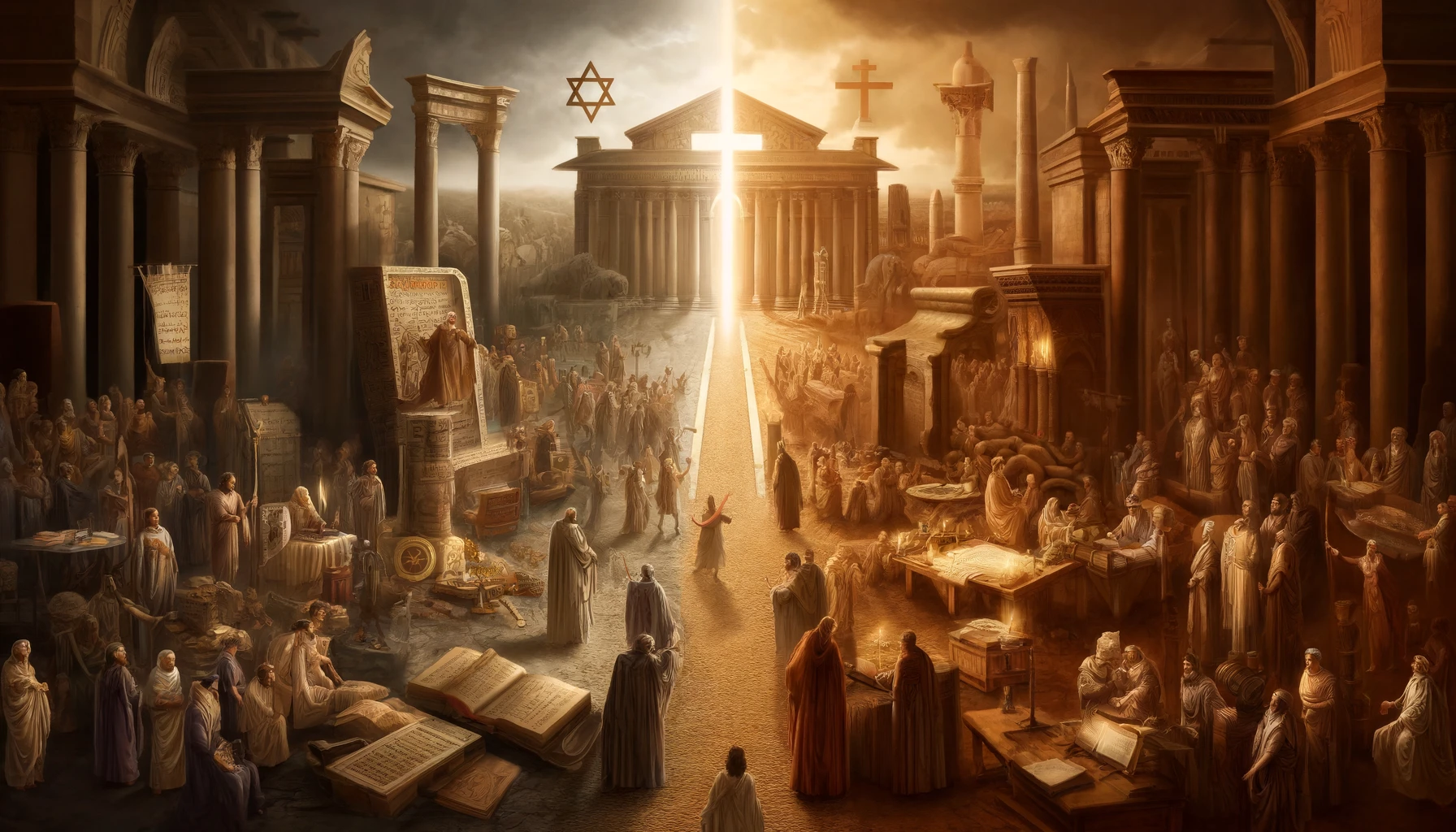Introduction
Judaism and Christianity share common roots, yet today they stand as distinct religions with different beliefs, practices, and traditions. How did this divergence happen? In this article, we explore the key historical events and theological developments that led to the parting of ways between these two major world religions. By examining their shared beginnings and the crucial moments of separation, we aim to uncover how two faiths that once coexisted within the same religious framework ultimately took different paths.
Shared Beginnings
Christianity began as a Jewish sect, with Jesus of Nazareth and his earliest followers identifying themselves as Jews. They adhered to Jewish law, attended synagogue, and participated in Jewish festivals, believing that Jesus was the promised Messiah foretold in Jewish scripture. The early Christian community, primarily based in Jerusalem, considered themselves part of the Jewish tradition, even as they proclaimed that Jesus had fulfilled Jewish prophecies.
The first Christians were devout Jews, and Christianity’s earliest scriptures—what is now known as the New Testament—reflect a deeply Jewish context. Jesus was often referred to as “Rabbi” by his followers, and his teachings, including the emphasis on love, mercy, and justice, were rooted in the Jewish tradition . However, a key difference began to emerge in how his followers viewed his role in God’s plan for humanity.
The Messiah Concept
One of the most significant points of divergence between Judaism and Christianity was their differing interpretations of the Messiah. For centuries, Jewish expectations of the Messiah centered around the coming of a political or military leader who would liberate Israel from foreign oppression and restore the kingdom of David . In contrast, Christians viewed Jesus as the spiritual savior who brought redemption through his crucifixion and resurrection .
For the majority of Jews at the time, the fact that Jesus did not fulfill these political and nationalistic expectations made it impossible to recognize him as the Messiah . While Jesus’ followers proclaimed that he had ushered in a new spiritual era through his sacrifice, the Jewish religious leaders rejected this claim, seeing Jesus’ death as proof that he was not the awaited leader. This theological rift deepened the divide between the two groups.
The Council of Jerusalem (circa 50 AD)
A key moment in the early history of Christianity was the Council of Jerusalem, around 50 AD, where early Christian leaders debated whether Gentile (non-Jewish) converts to Christianity needed to follow Jewish law. At the heart of this debate was the question of whether new converts were required to undergo circumcision and adhere to dietary restrictions .
Paul, a key figure in early Christianity, argued that faith in Jesus alone was sufficient for salvation, and that Gentile converts did not need to observe Jewish law . This marked a turning point, as Christianity began to distinguish itself from its Jewish roots. By making Christianity accessible to non-Jews without the requirement to follow the Jewish law, the movement expanded beyond the bounds of the Jewish community and began to take on a more universal identity .
The Destruction of the Second Temple (70 AD)
Another significant event that contributed to the growing divide between Judaism and Christianity was the destruction of the Second Temple in Jerusalem by the Romans in 70 AD. The Temple had been the center of Jewish worship and religious identity for centuries . Its destruction was a devastating blow to the Jewish community and led to a profound transformation in Jewish religious practice, shifting from Temple-based worship to a focus on Torah study and synagogue life .
For the early Christians, however, the destruction of the Temple was seen as less central. By this time, Christianity had already begun to spread to other parts of the Roman Empire, and its followers were more focused on the resurrection of Jesus than the traditional Jewish rituals tied to the Temple. This divergence in focus further accelerated the separation between the two faiths .
Theological Differences
At the core of the growing split between Judaism and Christianity were fundamental theological differences. While both religions believed in the God of Israel and revered the Hebrew scriptures, they had different views on salvation, sin, and the nature of the relationship between God and humanity.
For Christians, Jesus’ death and resurrection became the central focus of salvation. They believed that through Jesus, humanity’s sins were forgiven, and eternal life was made possible . Christians saw Jesus as the new covenant, replacing the old covenant God had made with the people of Israel . Judaism, however, maintained that the covenant between God and Israel, based on the laws and commandments given to Moses, was eternal and unchanging . Jews did not accept the notion that Jesus was the Messiah or that salvation could be achieved through him .
Conclusion
The split between Christianity and Judaism was not a sudden or singular event, but rather a gradual process shaped by both theological debates and historical circumstances. From differing interpretations of the Messiah to the impact of Roman rule and the destruction of the Temple, these two religions slowly moved away from their shared origins. Christianity grew into a distinct faith with a global following, while Judaism continued to evolve as a community bound by a direct covenant with God .
By understanding the roots of this divergence, we can gain deeper insight into the distinct paths these two religions have taken and their profound influence on the course of history.

References
- Jewish and Christian Origins:
- Encyclopaedia Britannica: https://www.britannica.com/
- Jewish Virtual Library: https://www.jewishvirtuallibrary.org/
- Bible Odyssey: https://www.bibleodyssey.org/
- Messianic Expectations in Judaism and Christianity:
- Stanford Encyclopedia of Philosophy (Messiah entry): https://plato.stanford.edu/entries/messiah/
- Jewish Virtual Library (Messiah in Judaism): https://www.jewishvirtuallibrary.org/messiah
- Council of Jerusalem:
- Catholic Encyclopedia: https://www.newadvent.org/cathen/
- Oxford Biblical Studies: https://global.oup.com/obso/
- Destruction of the Second Temple:
- PBS: The Jewish Roman Wars: https://www.pbs.org/
- Jewish Virtual Library (Second Temple): https://www.jewishvirtuallibrary.org/the-second-temple
- Theological Differences:
- Theology Online: https://www.theologyonline.com/
- Stanford Encyclopedia of Philosophy (Salvation in Christianity): https://plato.stanford.edu/entries/salvation-christianity/

